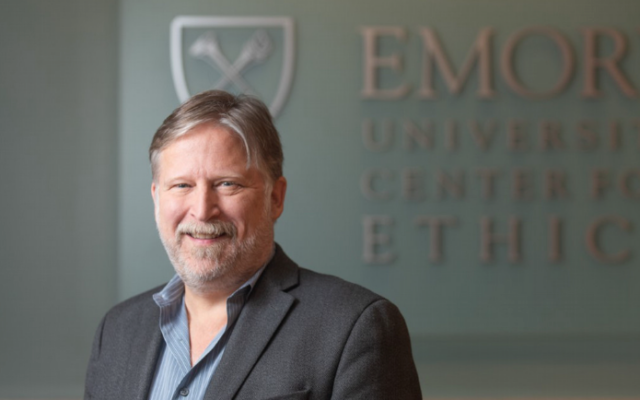Wolpe Starts New Emory Center to Cool Conflicts
Mediation and conflict resolution will be important goals of new national center that Emory professor Paul Wolpe is creating.
The director of the Emory University Center for Ethics, Paul Root Wolpe, is stepping down at the end of May to create a new national program at Emory to manage conflict, promote peace, and build bridges to greater understanding. The new center, which will take shape over the next three years, is in response to what Wolpe sees as an urgent need in this country and around the world to lower the temperature of public dialogue.
“We’re in a situation in this society where people no longer know how to talk to each other, and we see that so clearly in politics. You see that in Israel and Gaza and even with the students I’ve taught at Emory. We need to do a better job of knowing how to engage difficult conversations around contentious issues,”
The new center will build on the work that Wolpe has done over the past 16 years as the university’s Distinguished Research Chair of Jewish Bioethics and as a professor of medicine and neuroscience. Emory’s Vice President for Academic Affairs, Ravi Bellamkonda, credits Wolpe with having a profound impact on an engagement and understanding with ethical issues. And in the coming years, he is looking to Wolpe to expand Emory’s role in helping to solve important contemporary issues.

“Paul will continue to guide Emory’s response to some of the most pressing issues of the day,” Bellamkonda noted, “and position Emory as a leading resource for dialogue, civil conversation and reconciliation.”
Dr. Wolpe believes that Atlanta is ideally suited to become the home for the center he envisions. He points to the many relationships the university has nurtured over the past half-century.
Emory has worked closely with former President Jimmy Carter and his Carter Center, the family of the Rev. Martin Luther King, Jr., and the King Center for Non-Violent Social Change. It also has an ongoing partnership with the Dalai Lama, who has visited frequently to teach and lecture on the subject for peace and understanding. The city is also the home for the National Center for Civil and Human Rights, which is in the midst of a major expansion of its programs and facilities. According to Wolpe, helping people to come together peacefully is an important part of Atlanta’s heritage.
“We have a storied history of being a place that tries to avoid conflict and exclusion, where people work together. And we have enormous resources here for the people who do this work. So, I think Atlanta is the natural place to be the national center of conflict resolution. I’ve been making efforts to share my commitment with political leaders and civic leaders, and everybody seems to think it’s a wonderful idea if we can pull it off. So that’s the big vision.”
Even though he hasn’t formally started his new job yet, during the past year he’s already been at work in the Jewish community to calm the waters. His long family history of rabbinical leadership, which includes his father who was a famous rabbi, two brothers who have been national religious figures, and his daughter, who is an Atlanta rabbi who runs a nonprofit here, has given him a unique perspective to mediate the dispute.
“Just recently, a Jewish organization, I won’t name it, was having some internal conflict over the Israel-Gaza situation,” Wolpe said. “We tried to help them negotiate how to deal with the issues that created. This new center is not just going to do academic work, we intend to continue to engage in active mediation and conflict resolution.”

In preparation for his new job, Wolpe is taking the next year to research best practices and develop relationships with some of the international organizations that are already at work at soothing the world’s conflicts. He plans to visit a number of centers in various countries, including Israel, for new insights of what he describes as a “global glimpse of how people do this work.” His first priority, though, is not in the international arena, but in American social and political life.
“We’re going to start domestically. And that means community conflict, corporate and organization conflicts, and geo-conflicts. That means conflicts between political and pseudo political … to try to bring the two sides together. And of course, we’ll be looking at certain issues like Israel and the Palestinians as it manifests itself domestically. Because, as we well know, there’s an enormous amount of conflict in the United States about what’s happening.”
For the next year, as he travels around an increasingly contentious universe the most important job Wolpe sees for himself is learning how to have difficult conversations that reach beyond the ideological divide.
“How do we take people with completely different views of the world and have them communicate in a way that’s validating to both of them.”




comments